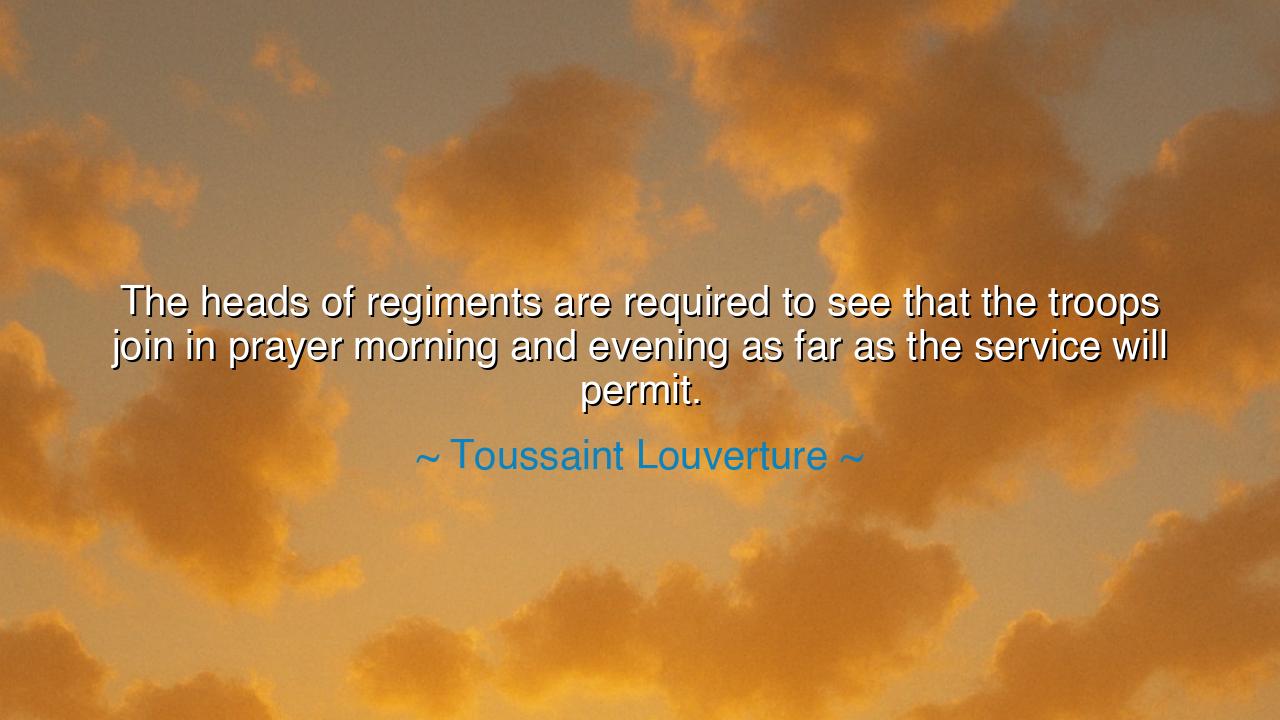
The heads of regiments are required to see that the troops join
The heads of regiments are required to see that the troops join in prayer morning and evening as far as the service will permit.






“The heads of regiments are required to see that the troops join in prayer morning and evening as far as the service will permit.” Thus spoke Toussaint Louverture, the great liberator of Haiti, a man born in bondage who rose to lead armies and inspire nations. These words, though stern and orderly, shine with a deeper flame: the recognition that strength in battle does not rest in the sword alone, nor in discipline alone, but in the spirit of men lifted by prayer, bound together in faith, and united under the gaze of the Eternal. Louverture understood that war was not only of flesh and blood—it was also of the soul, and that without spiritual grounding, the soldier’s courage could wither like grass before the fire.
The origin of this quote lies in Louverture’s command during the Haitian Revolution, when enslaved men and women, once denied dignity, rose in arms against their oppressors. He knew that such a struggle demanded more than weapons; it demanded hope, endurance, and conviction. By commanding that morning and evening prayers be observed, he sought to remind his troops that their cause was sacred, that their fight was not merely for survival but for freedom ordained by heaven. Thus, prayer became both shield and banner, a daily ritual to bind their hearts together in unity.
The ancients also understood the power of ritual in battle. In Rome, legions offered sacrifices before marching, seeking the favor of their gods. In Israel, the warriors of old carried the Ark of the Covenant into battle, a symbol that reminded them of divine presence. Even the Spartans, fierce and unyielding, sang hymns before combat to stir their souls. In all ages, leaders have known that the spirit of an army is its truest weapon. Louverture, wise in this same tradition, knew that to keep his troops praying morning and evening was to keep their eyes lifted above fear, toward the cause that sanctified their struggle.
History gives us vivid proof of this principle. Consider George Washington, who during the American Revolution was often seen in prayer in the forests of Valley Forge, where his starving, freezing troops held to hope by the slender thread of faith. It was not steel alone that kept them from collapse, but the conviction that Providence walked with them. Likewise, Louverture’s soldiers, many of whom had known only chains, drew strength from prayer that reminded them they were no longer slaves, but children of God destined for freedom.
The lesson we must take is this: discipline of the spirit is as vital as discipline of the body. To pray morning and evening, whether in the camp of soldiers or in the life of ordinary men and women, is to remember that our struggles are not endured alone. It is to pause, to lift one’s gaze above the immediate toil, and to recall that there is a purpose higher than the hardship. Louverture was not merely commanding ritual; he was instilling resilience. For the man who begins and ends his day in prayer, in reflection, or in gratitude, is less easily broken by the storms of life.
Practical wisdom flows from this. If you would be strong, set aside moments each day—morning and evening—to ground yourself, whether through prayer, meditation, or reflection. Begin your day not with haste, but with intention. End it not with distraction, but with gratitude. These simple acts, repeated daily, become like the training of soldiers: they forge endurance, sharpen focus, and anchor the heart. Whether you face the trials of war or the quiet struggles of daily living, such practices will give you strength.
Thus, remember Louverture’s words: “The troops join in prayer morning and evening.” They are not merely the command of a general, but the wisdom of a leader who knew that freedom is preserved not only by the sword, but by the spirit. So too in our lives: let us keep our mornings and evenings sacred, for in them lies the strength to endure, to fight, and to prevail. For those who guard their spirits with prayer will march forward unbroken, no matter the battle they face.






AAdministratorAdministrator
Welcome, honored guests. Please leave a comment, we will respond soon